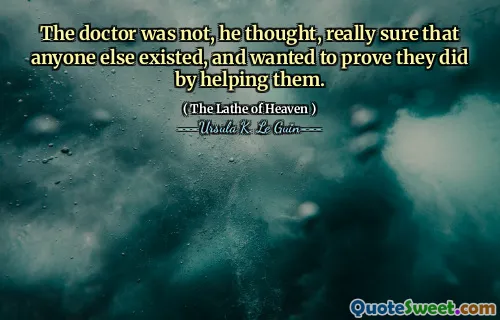
The doctor was not, he thought, really sure that anyone else existed, and wanted to prove they did by helping them.
This quote delves into the complex nature of human perception and the fundamental need for connection. The notion that the doctor is uncertain about the existence of others touches on philosophical questions of solipsism—the idea that only one's mind is sure to exist. In a way, the doctor’s uncertainty reflects a profound existential doubt, emphasizing how individual consciousness can sometimes create a bubble that isolates us from perceiving others as truly autonomous beings. His desire to 'prove they did by helping them' suggests that acts of service and altruism serve as tangible affirmations of another's existence and worth. It highlights a crucial insight: that meaningful human relationships often hinge on empathy and active engagement. Helping others becomes both a recognition of their independent reality and an effort to bridge the fundamental loneliness that may arise from our internal doubts. In the context of Ursula K. Le Guin’s work, such themes are often intertwined with explorations of reality, perception, and authenticity. The quote invites us to consider how our perception of others shapes our worldview. It challenges us to think about how acts of kindness don't only benefit those on the receiving end but also reaffirm our own sense of connection and reality. Ultimately, the quote underscores that in our pursuit of understanding and validating others' existence, acts of genuine caring are powerful tools that dissolve the barriers of doubt and isolation inherent in the human condition.






